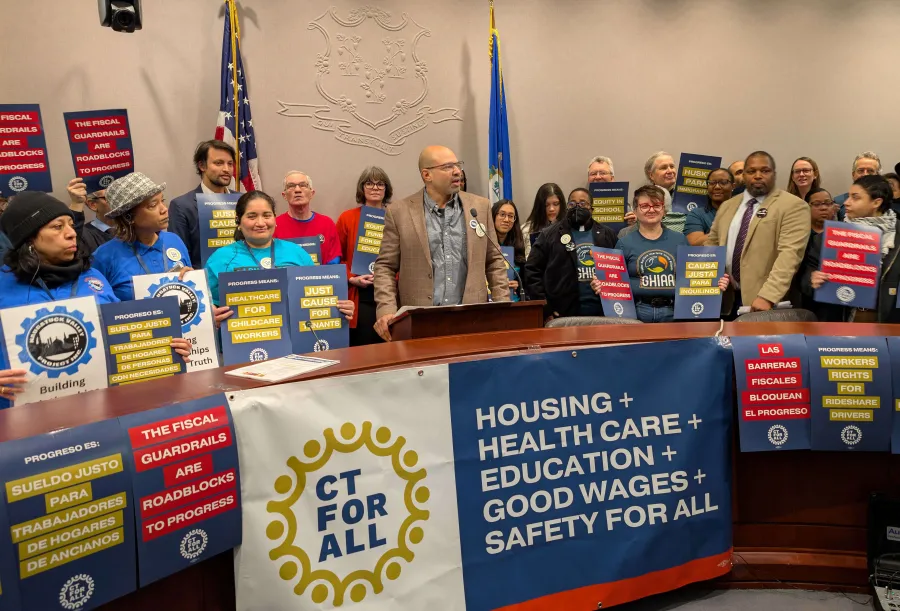Connecticut For All Coalition Presents the 2025 Equity Agenda

[Hartford, CT] – This morning, nearly 200 people joined the Connecticut For All coalition to present the 2025 Equity Agenda - a roadmap for Connecticut to lift up all of our community members. The coalition's recommendations include introducing fair tax structures that ask the wealthiest residents to contribute their fair share while expanding support for working families through targeted investments in education, affordable housing, and healthcare. The 2025 Equity Agenda builds on years of grassroots advocacy, with community, faith, and labor leaders at the forefront of driving change. This is not just a list of policies—it’s a movement.
Review the Equity Agenda in its entirety HERE.
“Year after year we have returned to this building to do the work of the people. We return inside of a rhetorical milieu of equity,” said State Senator Gary Winfield, representing the 10th Senate District (New Haven & West Haven), “Because we continue to fail to make the necessary investments in the very programs that hit the root causes of inequity- housing, education, healthcare, public services those words serve only as platitudes with little if any meaning in the lives of the many who need them to be our call to action. We cannot continue to allow our upside down tax structure and irresponsible fiscal policies dictate our investment decisions and the chance at a better Connecticut.”
“Our constituents elected us this past November to be their voice at the Capitol as we fight for the critical investments our communities need, investments that have been drastically underfunded for too long,” State Representative Jillan Gilchrest, representing the 18th House District (West Hartford), “The legislature has the power - and numbers - to make bold changes to our fiscal policies and tax system so that they work for all of Connecticut and move our economy forward in a positive growth direction.”
“The Equity Agenda represents a roadmap to a better future for Connecticut - one where workers are valued and protected, where families have the keys they need to thrive, and where our state’s economic health is directly tied to the strength in our communities,” said Rob Baril, President of SEIU 1199, “For too long, working families have had to make difficult choices while our state siphons off billions and protects the ultra-wealthy and corporations from paying their fair share. It’s past time for our legislators to stand up and address the issues that we elected them to fix.”
“Despite undocumented immigrants contributing $406 million in annual contributions to state and local taxes, most of us cannot see a doctor because of our status,” said Valentina Diaz, member of CT Students for a Dream and HUSKY For Immigrants, “Connecticut residents should be seeing our tax dollars invested in the programs that support our communities, not paying an old debt at an irresponsible rate while watching our urgent needs multiply. How many more of us have to needlessly suffer from preventable illnesses and conditions until we see the modest investment we need?”
“The reality is, the low pay makes it hard to attract and retain staff. I often work 16-hour shifts because there simply isn’t enough staff,” said Meriam Robinson, LPN, a Nursing Home Worker at Trinity Health, “My coworkers and I are burned out, mentally and physically. I’ve gone from being someone who never struggled with depression to now relying on medication just to cope with the stress of this job. And yet, I advocate for my residents, ensuring they get the food, care, and resources they need, because if I don’t stand up for them, who will?”
“As our institutions become more and more black and brown -- students at the CSUs have suffered from increased tuition and fees, the defunding, and cut programs,” said John O’Connor, a Sociology Professor at Central CT University, “For many years, CSU students have been getting degrees not in Shakespeare, but in Austerity. The Governor, OPM, and politicians in this building should be ashamed. To invest in education, is to invest in Connecticut’s future.”
“Despite dedicated educators, the limited resources, large caseloads, and insufficient training widened my son’s achievement gap while he attended New Haven Public Schools,” said Jennifer Graves, VP of the New Haven Federation of Teachers, Parent & Special Education Teacher, “Even though his school wanted him to succeed, they could not afford to do more. When we transferred to our home district in North Haven, he gained access to specialized programs and smaller classes that transformed his school experience, displaying a stark disparity between two districts just 10 minutes apart. ZIP codes must no longer determine educational opportunities.”
“Since 2018, $12.5 billion dollars were labeled surplus and hoarded away from available resources,” said Rev. D Littlepage, Canon for Advocacy, Racial Justice, and Reconciliation in the Episcopal Church of CT & GHIAA Strategy Team Member, “It makes me think of a story in the Christian scriptures from the gospel of Luke where Jesus tells the parable of a wealthy landowner who had an over abundant crop one year. Instead of filling up his existing barns and letting the rest flow into the community around him, he built bigger barns to hoard away as much of the available resources as possible. And you know what, Jesus called him a fool.”
“When looming cuts to federal funding, and an over-reliance upon fiscal guardrails threaten our state budget, one common-sense solution would represent a direct investment in our people – without a dollar being spent,” said Zach Postle, leader with the CT Tenant Union, “For over 40 years, Connecticut’s “Just Cause” law has prohibited no-fault evictions against renters who are 62 years or older, or have a disability, and live in a building with 5 or more units. The simple question is, why don’t we extend these protections to everyone?”
###
Connecticut For All (CTFA), formerly Recovery For All, is a statewide coalition of more than 60 community, faith, labor, and nonprofit advocacy organizations united in a long-term mission to reduce and eliminate systemic racial, economic, and gender inequities in Connecticut.
